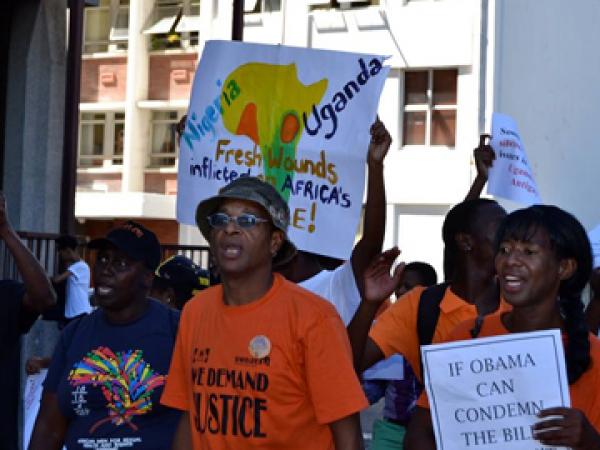

Photo courtesy of Sonke Gender Justice.
16 May 2014
Things are looking up, right? Just days ago, our beloved Caster Semenya was in the headlines of none other than the Daily Sun, not because her gender or hormone levels were, once again, put under a degrading spotlight, but because she had announced her soon-to-be marriage to her girlfriend.
And less than a month ago, the South African government—particularly the Department of Justice and Constitutional Development—launched a three-year campaign that focuses on promoting and protecting the rights of lesbian, gay, and transgender people.
So we can relax a bit now, knowing that the government, as well as our fellow citizens, have finally understood and embraced people’s right to love who they want and be who they want. Right?
Wait. But then there’s David Olyn’s brutal murder in Ceres in March of this year, where at least one man proudly tortured and murdered 21-year old gay man David Olyn, inviting others to participate and watch. While the primary suspect has been arrested, we know that the police have yet to even interview these bystanders.

Photo courtesy of Sonke Gender Justice.
Or there’s 26-year old lesbian Duduzile Zozo, who was horrifically raped with a toilet brush and strangled in July last year in Thokoza, apparently by a young man who was her neighbour. Or there’s the South African government’s claim that it’s not their place to speak out against homophobia perpetuated by African leaders.
Shall we continue?
At the launch of the lesbian, gay, and transgender rights campaign at Constitution Hill in Johannesburg, which was led by Minister of Justice and Constitutional Development Jeff Radebe and his Deputy, John Jeffrey, Radebe outlined the five elements of the initiative. These included a national intervention strategy for the civil society sector that focuses on issues relating to sexual orientation and gender identity, terms of reference for a Rapid Response team, a television ad, and an information pamphlet on sexual orientation and gender identity for the broader public. Unfortunately, despite having a Communication Strategy funds appear to be as of yet insufficiently allocated to successfully implement the wide range of operations currently envisioned for this initiative.
While this may be concerning on its own, this is not the first time our government has proclaimed their commitment to protecting the rights of people based on their sexual orientation or gender identity, and then not followed through. We, as gender activists, ask: Why should we believe you that, this time, it’s different? Where will the resources come from, and how will you, Justice Radebe and colleagues, ensure that the resources match the intent?

Photo courtesy of Sonke Gender Justice.
During the launch both Radebe and Jeffery also applauded South Africa as being “a world leader on [lesbian, gay, and transgender] rights”. Yet, despite the impressive work done by South African civil society around rights of people based on sexual orientation and gender identity and the legacy of a Constitution that protects these rights, the current South African government has remained silent and complacent rather than speak out against homophobia in the region such as Nigeria and Uganda’s recent passing of anti-homosexuality laws that pose serious and grave risk to lesbian, gay and transgender persons as well as those who seek to support them. We, as gender activists, can’t help but ask: Where is our government’s leadership when our African comrades need us? Why is it that the South African government will condemn “all forms and manners of terrorism”, but when it comes to another government’s brutal attack and condemnation of people based on what they look like and who they love, its voice is nowhere to be heard?
We want to be excited for the launch of this campaign. And indeed, it is a commendable achievement that included the tireless efforts of civil society working to ensure it happened.
But, dear government, until we see the evidence gathering for David Olyn’s case taken seriously, and his murderers successfully prosecuted, our faith will not be renewed. Until we hear that Duduzile Zozo’s rapist and murderer is held to account in his trial that will take place later this month, from 26 May to 13 June, we will remain skeptical that you, in fact, will not tolerate hate crimes. Until you speak out against the homophobia sweeping across our continent, and remind fellow African leaders that homosexuality is as African as humanity is, we will raise our eyebrows when you proclaim that we are world leaders in protecting human rights.
And until you put your money where your mouth is, and ensure that this campaign to promote and protect the rights of lesbian, gay, and transgender people is implemented with sufficient resources, commitment, and impact, we as gender activists will be waiting in solidarity with our civil society comrades, by your side, asking you to do so.
Laura Pascoe is the Sexual and Reproductive Health and Rights Programme Specialist at Sonke Gender Justice in Cape Town.